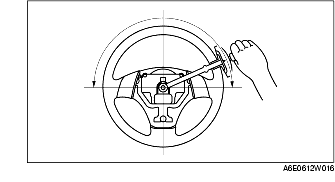STEERING WHEEL AND COLUMN INSPECTION
id061400800300
Play Inspection
1. With the wheels in the straight-ahead position, start the engine.
2. Turn the steering wheel to the left and right gently, then measure the steering wheel play.
-
Standard
-
0-30 mm {0-1.18 in} (oil pressure applied)
Looseness, Excessive Play Inspection
1. Inspect the steering wheel for the following items while moving it in the axial direction and sideways.
-
• If there is any malfunction, replace the applicable part.
-
- Looseness of the steering wheel installation part
-
- Looseness of the column installation area
-
- Column bushing wear
-
- Excessive play of the column bearing
-
- Excessive play of the steering shaft universal joint
Steering Wheel (With Integrated Air Bag Module) Effort Inspection
-
Note
-
• Verify that the front wheel alignment is correct and the tire pressure is within specification before inspecting the steering force.
1. Place the vehicle on a dry surface and apply the parking brake.
2. Put the thermometer into the power steering fluid reservoir tank.
3. Idle the engine for 2-3 min. Turn the steering wheel fully to the left and right and raise the fluid temperature to 50-60 ×C {122-140 ×F}.
-
Caution
-
• Do not maintain the steering wheel fully turned to the left and right for 3-5 s or more. This may damage the power steering pump.
4. With the engine running, install a pull scale on the steering wheel rim.
5. Measure the force required to turn the steering wheel for 1 revolution to each side.
-
Steering wheel effort
-
30 N·m {3.1 kgf·m, 22 ft·lbf} or less (Reference value)
Steering Wheel (Not With Integrated Air Bag Module) Effort Inspection
1. Inspect the following.
-
• Tire size and tire pressure
-
• Fluid level
-
• Drive belt deflection
2. With the vehicle on a hard, level surface, put the wheels in the straight-ahead position.
3. Remove the air bag module.
-
Warning
-
• Handling the air bag module improperly can accidentally deploy the air bag module, which may seriously injure you. Read the service warnings before handling the air bag module. (See DRIVER-SIDE SIDE AIR BAG SENSOR REMOVAL/INSTALLATION.)
4. Start the engine, turn the steering wheel to the left and right to make the power steering fluid rise to the suitable temperature (50-60 ×C {122-140 ×F}).
-
Caution
-
• Do not maintain the steering wheel fully turned for 5 s or more. It is possible that oil temperature can rise, and this will negatively affect the oil pump.
5. Measure the steering wheel effort using a torque wrench.
-
• If not within the reference value, inspect the following:
-
- No air in the steering system
-
- No fluid leakage from hoses or connectors
-
- Function of the oil pump and steering gear
-
Steering wheel effort
-
7.8 N·m {80 kgf·cm, 69 in·lbf} or less (Reference value)
-
Note
-
• To determine whether the steering effort is satisfactory or not, perform the inspection on another vehicle of the same model and under the same conditions, and compare the results.
-
• The steering wheel effort varies with conditions as shown below.
-
- Road conditions: such as dry or wet, and asphalt or concrete
-
- Tire conditions: such as brand, wear, and tire pressure
